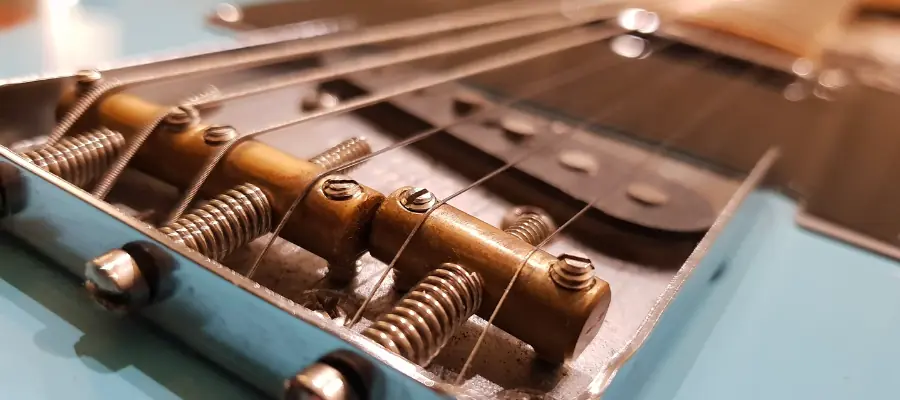As a guitarist, you work so hard to achieve the perfect sound that having it subdued by ringing or buzzing can feel very disheartening. However, something players and enthusiasts can’t seem to agree on is when it comes to the question of the thinner guitar strings buzz more.
Thinner guitar strings can buzz more; however, that’s not always the case. Thinner strings will be more prone to buzzing than their thicker counterparts when all other variables are kept equal since they have lower tension. However, several factors affect string buzz. With the right adjustments on the guitar, like higher guitar action, thinner strings do not create any buzz.
As you can see, the answer to this question isn’t as cut-and-dry as you might’ve expected. Still, the truth remains that a lower gauge can make a string more prone to buzz, so read on to find out exactly why that is.
In the following sections, I’ll also give you some tried-and-true tips on reducing buzzing to the best of your abilities, so if this is an issue you’re actively dealing with, you’ve come to the right place.
Why Do Thinner Guitar Strings Buzz More?

Before explaining why thinner guitar strings buzz more, I want to note the general differences between thinner and thicker strings.
The string gauge refers to a string’s thickness, measured in a thousandth of an inch. The higher the gauge, the thicker the string, and vice versa. Thicker strings (with gauges of 0.013 or above) are generally better for musicians who prefer to experiment with their sound or have an aggressive playing style.
On the other hand, thinner strings create a cushier, effortless sound. And they are easier on the fingertips. However, since they create less tension, they’re more prone to buzzing than their higher-gauge counterparts.
They also have less mass and tension, meaning they can vibrate more easily, come in contact with the frets, and create that annoying buzz most of us have dealt with at least once. They can even create a louder, rattling sound that can throw your whole melody off.
If you have a heavier hand or a lower-action setup, these issues become even more prominent.
With all that said, thicker strings can create buzz, too. As I briefly mentioned above, several factors can affect the frequency and volume of string buzz, so gauge isn’t the only concept to consider here.
For example, if you haven’t set up your thicker strings correctly or the frets are worn down, chances are you’ll also experience quite a bit of buzzing with them. This time, the resulting noise might be even more disruptive as the strings boast a greater mass.
When you keep all these other variables equal, lower-gauge strings will consistently buzz more than their higher-gauge counterparts, not only for the above reasons but also because they’re more flexible and, thus, more prone to contorting to less-than-ideal positions.
Though, by this point, buzzing might seem unavoidable (and, to a certain degree, it can be), the good news is that there are some simple steps you can take to help diminish it to an unnoticeable degree, if not eliminate it altogether.
How To Reduce Buzzing in Guitar Strings

Below, I’ll cover some of the most fool-proof steps you can take to reduce buzzing in guitar strings of all gauges. Though each can make a difference in improving your playing experience, combining several (or, preferably, all) is your best bet.
Perfect Your Guitar’s Setup
Improper setup is one of the most common causes of string buzzing. That’s why, if you’re dealing with this issue, you’ll first want to check the guitar’s neck relief, intonation, and action and make any adjustments as needed.
With thinner strings, you need more space between the fretboard and the strings so that the strings can vibrate freely without touching the frets. As thinner strings vibrate in a greater range than thicker ones, you need the action to be higher.
However, if you’re not too confident in your knowledge and skills, leaving this job to a professional is best. They’ll be much better able to adjust string length and intonation to optimize playability and sound. You can always take note of what they do and ask them relevant questions until you can do the work yourself.
Use Higher Gauge Strings
Since it’s been established that thinner strings can contribute to increased buzz, switching to a thicker model can be the solution you’re looking for. As long as you don’t mind the change in sound and playability, the higher mass and tension will keep the strings from vibrating too much, hitting the fretboard, and causing buzzing and ringing.
It’s worth experimenting with different gauges to see which one optimizes both your style and playing experience.
Work on Your Technique
Poor technique is one of the main causes behind sound distortions in guitar, buzzing included. So, if none of the other methods seem to work, it might be time to take a hard, realistic look at your technique.
In fact, even experienced players fall for this trap if they favor a more aggressive playing style, so there’s no shame in trying to improve your skill set. So, try experimenting with softer movements or slightly adjusting the angle of your pick.
If you don’t know where to start, you can always enlist the help of a professional.
Invest in Higher-Quality Strings
Some cheaply-made strings will buzz no matter how thick or thin, so it’s always worth checking if the issue lies in the strings themselves rather than your technique. So, if your budget allows it, I highly recommend investing in higher-quality strings. Elixir is a great string brand with high-quality materials and a longer lifespan.
You won’t only get far less buzz but a smoother, generally better sound as well.
Conclusion
Though thinner guitar strings are more prone to buzzing due to their lower tension and smaller mass, several factors can lead to buzzing strings of any gauge. So, if you want to avoid the issue, your best bet is to read through the tips outlined above and apply as many of them as possible to your day-to-day playing.
Generally speaking, having a proper setup, being diligent about equipment maintenance, and perfecting the proper technique can all help achieve that smooth, buzz-free sound you’re after.
If you found this article useful, you may want to save this pin below to your Guitar board.

Recent Posts
When learning new songs have you noticed that some of the chord sequences sound really good? But when you tried to come up with your own chord sequence, or as we call it chord progression, you found...
Some guitarists insist on buying an expensive amplifier with their electric guitar. They assume that this is a must for every type of guitarist out there. However, in some situations, this isn’t...

